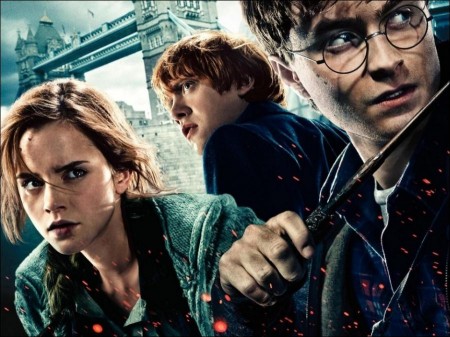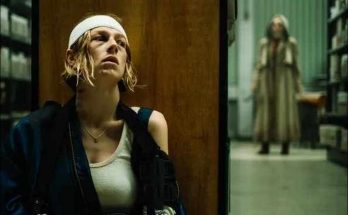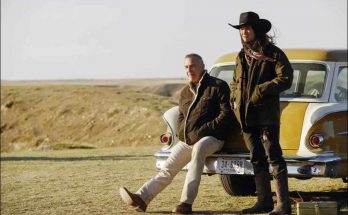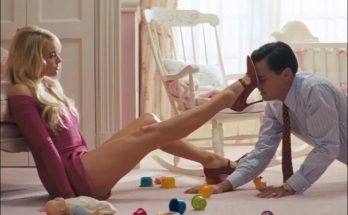You are a wizard Harry!
Ten years ago, those four words signified the beginning of the extraordinary cinematic journey of a boy whose name became synonymous with magic: Harry Potter. Over the next decade, the film franchise that bears his name changed movie history while also changing the lives of its multi-generational ensemble cast and the filmmakers who devoted themselves to bringing J.K. Rowling’s seven-volume literary masterpiece to the screen.
Commencing with 2001’s “Harry Potter and the Sorcerer’s Stone” and culminating with the two-part adaptation of the final title, “Harry Potter and the Deathly Hallows,” the films have become the top-grossing franchise of all time, capturing the imagination of audiences around the world. Additionally, both the books and the movies have been woven into our culture, adding words like Muggle, Quidditch, Hogwarts and even Expelliarmus! to the global lexicon.
David Heyman, who, in 1997, discovered the as-yet-unpublished Harry Potter manuscript and has produced all of the movies, acknowledges, “I could never have imagined when we embarked on the first film the level of response from audiences through the years. It’s been beyond my wildest dreams, so I look back on it with great pride and with gratitude, for the fans and especially for Jo Rowling.”
Collectively, the Harry Potter movies were an unprecedented undertaking for all involved—no other motion picture series had ever followed a linear story surrounding the same characters over the course of eight full-length features.
Producer David Barron notes, “It really has been unique, but it was entirely dependent on having rich enough source material, and that, of course, began with the books.”
Creatively, states author and producer J.K Rowling, the single thread of the story was very much by design. “I had a very, very clear idea of where Harry was going to go. This was just one story that I wanted to tell. For me, that was key if the books were ever going to be made into films; it had to be done that way. When I met David Heyman, he completely understood.”
Rowling found another invaluable collaborator in screenwriter Steve Kloves, who has adapted six of the seven books. “Steve really got the books,” she says, adding, “I was always accepting of the fact that changes must occur in the process of moving from the page to the screen. But even the scenes that were different were always very true to the spirit of the books.”
Kloves remarks, “We had one cohesive, bracing tale that literally had no end when we began, since only the first three books had been published. Although that sometimes made for challenging circumstances, my instincts were pretty true. But in those instances when I was in need of assistance, I had an ally whose counsel I felt was reasonably sound: Jo,” he deadpans. “While she was never explicit, she was always available and highly adept at gently nudging me in the right direction. In the end, one principle proved pretty reliable: follow the characters.”
Director David Yates says, “In following the characters, many of the values that Jo celebrates in the books come to the fore in the films—the value of loyalty and love and friendship and understanding versus intolerance and evil.”
“The power of love is a huge theme throughout the books and the films, as well,” Rowling adds. “There are lots of different kinds of love expressed over the course of the story, but friendship is probably the strongest form of love that you see in the movies.”
The love between friends is embodied most in the characters of Harry Potter, Ron Weasley and Hermione Granger. They were portrayed by three young actors who literally grew up on the screen: Daniel Radcliffe, Rupert Grint and Emma Watson.
Radcliffe relates, “I couldn’t even attempt to sum up what the role of Harry Potter has meant to me, but I can say that I never took the opportunity to play him lightly. It may have been the same character, but like anyone else, Harry changed a lot over the years so, as an actor, I looked at each film as an opportunity to do something fresh and to develop another set of skills.”
“I feel very privileged to have played Hermione,” says Watson. “I think she’s someone young girls can look up to because she’s always true to herself. She’s very smart and an incredibly courageous and loyal friend who keeps a cool head in extremely difficult situations. It was wonderful to be able to bring across those elements of her personality throughout the films.”
“I know I’ll miss playing Ron because there was a time when I was him more than I wasn’t him,” Grint laughs. “And I really liked the development of his character. He started out as a kid who was quite easily scared and it was nice to see him grow up to be brave and resourceful, particularly in this last movie where they are in such an unpredictable and dangerous place.”
Heyman notes, “Over the course of these films, we’ve truly had the who’s who of British acting royalty on our stages, which was tremendous. But watching our young cast grow into fine actors and fine people has been one of the great joys of working on the Harry Potter films. We’re incredibly proud of them.”
Audiences have also watched all of the young characters in Harry Potter go from childhood to adulthood and, as they have matured, so have the stories. “It’s about engaging the imagination because those are ‘muscles’ that also need to be developed as a child grows up,” says Alan Rickman, who has played the enigmatic Professor Severus Snape in all of the movies. “In order for that to happen properly, there have to be some big themes to think about. What’s right and what’s wrong? Who do I trust and who don’t I? What does it mean to be brave…and what does loyalty mean? It’s all in there.”
Related Link: Harry Potter and the Deathly Hallows Part 2 Full Production Notes
Visits: 89



